Today’s patients are actively researching their healthcare options online using search engines, review sites, and even social media to guide their decisions. Healthcare is a serious decision, more often than not shaped by how your clinic’s reputation appears online. This discovery model makes doctor reputation management a strict necessity.
For multi-location clinics, the stakes are even higher. Inconsistent online reviews, inaccurate listings, and outdated patient feedback processes can lead to a fractured brand identity, lost visibility, and eroded trust not just at one clinic, but across your entire network.
This blog post covers what you need to know about managing online reputation for physicians and the top strategies to outshine competitors.
Table of contents
- What is doctor reputation management?
- Key factors that shape a doctor’s online reputation
- 10 tips to improve online reputation management for doctors
- Top 5 doctor review sites every clinic must focus on
- Birdeye – the ultimate doctor reputation management software your business needs
- Frequently asked questions about doctor reputation management
- Reach more patients with Birdeye
What is doctor reputation management?
Doctor reputation management refers to the process of building, monitoring, and protecting a doctor’s professional image online. It encompasses everything from managing online reviews, keeping listings accurate, responding to patient feedback, and ensuring consistent communication across websites, directories, and social media channels.
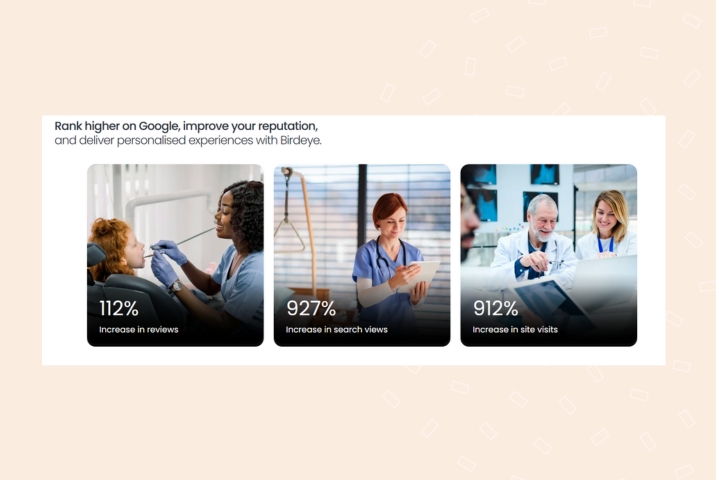
At its core, reputation management helps doctors present the best version of their practice to current and prospective patients through direct patient interactions and the digital footprint left behind by patient reviews and third-party listings.
Key factors that shape a doctor’s online reputation
Several elements contribute to a physician’s online reputation, especially in an era where most patients research providers before booking an appointment. Here are the key factors that can influence how a doctor and their clinic are perceived online:
- Use of review generation tools: Automating review requests ensures consistent new reviews from patients without burdening your front-desk staff. This helps amplify positive online reviews and reduce the skew of only unhappy patients posting feedback.
- Quality and quantity of online reviews: The volume and sentiment of online reviews on platforms like Google, RateMDs, and Healthgrades directly influence trust and visibility. A consistent stream of positive Google reviews from satisfied patients reinforces credibility and attracts new patients.
- Timely and professional responses to patient reviews: Whether it’s positive feedback or negative reviews, how a practice responds matters. Thoughtful, prompt replies show accountability and a commitment to patient care.
- Accuracy of business listings and contact details: Outdated or inconsistent information across directories can frustrate patients and hurt your local search results. Keeping listings up to date is a core part of online reputation management for doctors.
- Search engine optimization (SEO) and content strategy: Where you rank on Google determines visibility. Using relevant keywords, optimizing for local SEO, and regularly posting helpful content with great visuals ensures your practice is discoverable and trusted.
- Overall patient experience and outcomes: While word-of-mouth still matters, today’s feedback often appears as online reviews. That is why every touchpoint, from scheduling and wait times to bedside manner and follow-up care, contributes to patient satisfaction and online patient reviews.
Why is doctor reputation management important?
A strong online reputation for your clinic doesn’t just enhance visibility; it directly impacts trust, bookings, and long-term practice growth. Here’s why it matters:
- Influences patient decision-making: Most patients read online reviews before choosing a provider. A poor reputation can deter even referrals. In fact, Birdeye studies show that 68% of the time, consumers/patients check reviews before choosing a business.
- Drives higher local search visibility: Google prioritizes practices with frequent positive reviews and accurate listings, improving your position in local search results.
- Builds patient trust and loyalty: Responding to patient feedback and resolving negative reviews shows you value patient care, which encourages repeat visits and referrals.
- Supports consistent branding across locations: For multi-location groups, centralized reputation management ensures each clinic reflects your brand values and service quality.
- Helps win against competitors: A stronger doctor reputation management strategy means outranking similar providers in your area and capturing more new patients.
Now let’s dive into the top strategies for doctor reputation management for multi-location clinics.
10 tips to improve online reputation management for doctors
Effective reputation management for doctors involves shaping and managing brand image across the complete patient journey, from discovery to feedback. For multi-location clinics, this means creating scalable processes that promote positive online reviews, address patient concerns, and optimize every online touchpoint.
Here are ten actionable strategies every clinic should implement to strengthen their online reputation and attract more new patients.
Focus on patient review management
A strong review strategy is the backbone of any online reputation management for doctors. Not only do online patient reviews influence visibility and conversions, but they also act as valuable feedback for continuous improvement.
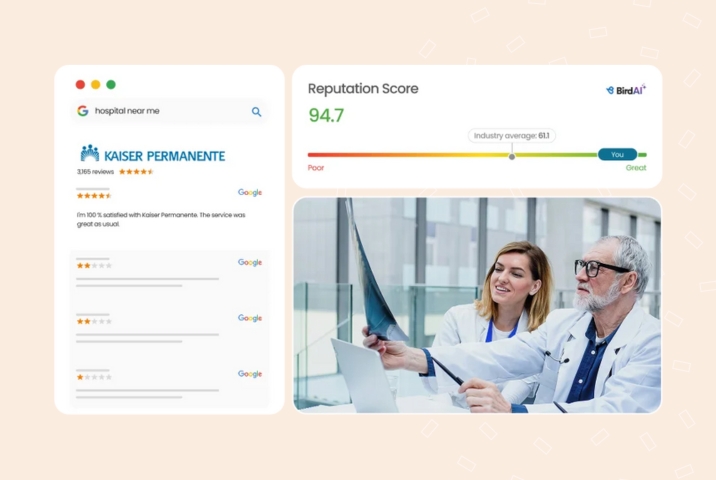
Why is doctor review management important?
- Over 80% of patients consider reviews before choosing a healthcare provider, a significantly higher-than-average number compared to other industries. Thus, doctor review management is a key strategy for attracting prospective patients to your practice.
- Patient reviews influence your standing on key review sites, such as Google, Healthgrades, and CareDash.
- Timely review responses help retain existing patients and reassure potential ones that you take their concerns seriously.
How to handle negative reviews for your clinics: Crucial tips
- Respond promptly and calmly, even when facing negative feedback so that prospective patients/clinics know that you care about feedback.
- Acknowledge the concern without being defensive, and suggest offline follow-up to resolve the issue.
- Use GenAI tools to analyze sentiment, flag potential risk areas, and generate appropriate responses at scale.
- Treat every complaint as a chance to improve operations and build a reputation for listening to patient concerns.
Birdeye studies on review trends show that healthcare providers prefer a personal touch when responding to reviews. 52% choose manual responses, while 48% opt for automation. But BrandAI from Birdeye bridges this gap by allowing businesses to customize brand voice and industry guardrails.
Assess your online presence across listing sites and directories
Your clinic’s visibility starts with being easily discoverable, and that means showing up accurately on every major directory where patients rely on information to make healthcare decisions.
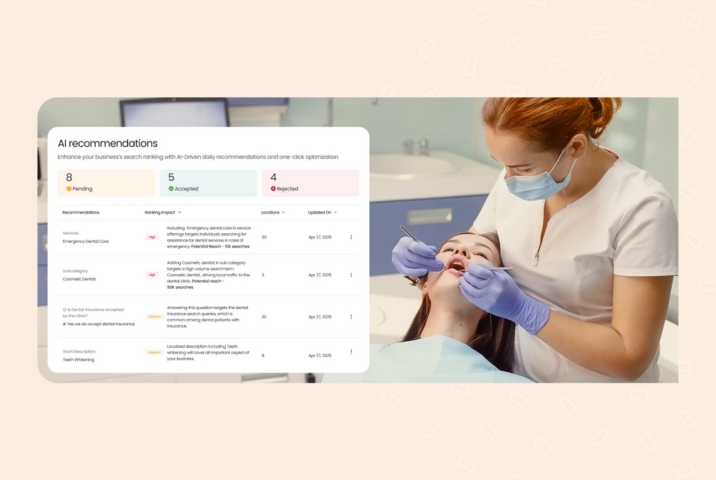
Before investing in ads or content, assess how your clinic is represented across platforms like Google Business Profile, Healthgrades, WebMD, and Vitals. Any inconsistencies here can hurt trust and damage your online reputation.
Here’s what to check across each listing:
- Business name, address, phone number (NAP) — Ensure consistency across all platforms.
- Operating hours and service descriptions — Update regularly to reflect holidays or provider changes.
- Photos, bios, and branding — Use high-quality visuals and descriptions that match your website and other listings.
For multi-location practices, tools like Birdeye Listings AI can automatically sync and monitor your listings across hundreds of platforms, improving your local SEO and online visibility with minimal effort.
Claim and build all clinic local listings
Claiming your clinic’s profiles on key directories is a critical first step toward improving your online reputation and boosting visibility in local search results. Unclaimed or unmanaged listings can lead to misinformation, missed patient inquiries, and reduced trust among prospective patients.

Here’s how to do it right:
- Start with Google Business Profile – It drives the majority of online patient reviews and controls how your clinic appears on Maps and Search.
- Claim listings on healthcare-specific directories like Healthgrades, Zocdoc, and Vitals to reach more targeted audiences.
- Use a reputation management platform to streamline the claiming process across multiple sites at once.
- Ensure profile completeness – Add service categories, accepted insurance plans, and provider bios to create a trusted and informative experience.
Build a cohesive local social media presence
Social media isn’t just a brand awareness tool; it’s a reputation channel. When done right, it reinforces your clinic’s credibility, humanizes your providers, and boosts engagement with potential patients and existing patients alike. But for multi-location clinics, managing dozens of local pages can quickly turn chaotic.
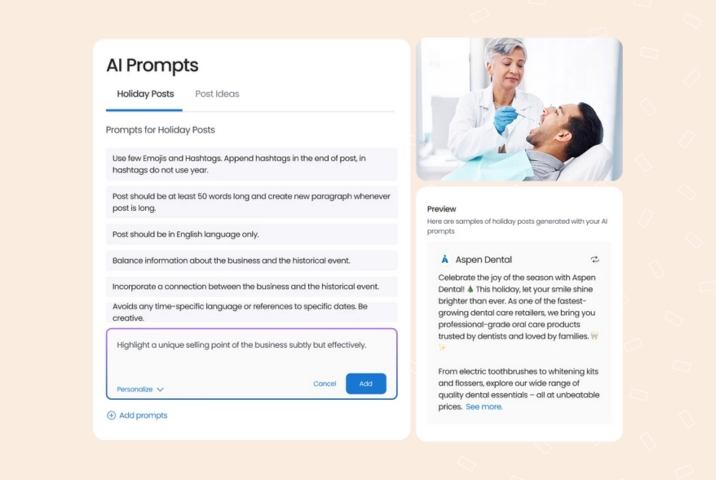
Here’s how to build a consistent, patient-centric social presence:
- Create branded templates for posts across locations to maintain visual consistency.
- Localize your content to highlight community events, provider spotlights, and health tips relevant to each city or region.
- Monitor patient comments and mentions to quickly respond to questions, concerns, or praise. This shows responsiveness and strengthens trust.
- Encourage patients to post reviews or tag your clinic in their success stories. It’s free and authentic social proof.
Tools like Birdeye Social AI help manage multiple pages from a central dashboard. With GenAI-powered content creation, post scheduling, and sentiment-driven replies, you can maintain a cohesive voice while tailoring content to each local audience for building a positive reputation across locations.
Improve patient experience across all touchpoints
Your online reputation is only as strong as your patient experience, and that experience begins well before a visit and continues long after. From the first website click to post-appointment follow-up, every interaction shapes how new patients and existing patients perceive your clinic.

To build lasting trust and generate positive patient reviews, focus on improving every step of the journey:
- Streamline appointment booking with intuitive online forms or AI-powered chatbots that reduce friction.
- Reduce wait times and improve in-clinic flow to enhance satisfaction during visits.
- Follow up proactively with post-care instructions and feedback requests with integrated tools like Birdeye Messaging AI
- Train staff on communication and empathy. A kind word at check-in can turn into a 5-star patient testimonial online.
Collect patient feedback consistently to identify concerns and boost loyalty
Routinely collecting patient feedback is one of the most effective ways to uncover operational issues, measure patient satisfaction, and drive loyalty. Yet many clinics treat feedback as a one-time survey instead of an ongoing source of insight that fuels reputation and practice growth.

Here’s how to make it a habit, not an afterthought, with Birdeye Surveys AI:
- Send review requests automatically after every appointment to capture timely, relevant feedback.
- Use online surveys to ask targeted questions about provider experience, wait times, and support staff. This helps uncover both strengths and pain points.
- Identify recurring patient concerns across locations by analyzing trends in negative reviews, comments, and survey responses.
- Act on valuable feedback quickly, and let patients know you’re listening. This builds loyalty and turns unhappy patients into advocates.
Repost positive feedback across all marketing channels
While you focus on creating engaging marketing campaigns for your practice, don’t miss out on using positive patient reviews and using your reputation to your advantage. Highlighting real feedback from satisfied patients builds credibility, boosts conversions, and reinforces a strong online reputation across touchpoints.

Here’s how to use review marketing to boost a doctor’s reputation:
- Feature patient testimonials on your website, homepage, and provider bio pages.
- Create social media posts using quotes from 5-star reviews and pair them with photos of your clinic or staff to add authenticity.
- Embed review widgets with GenAI-generated summaries on landing pages to improve trust and SEO performance.
- Include reviews in email campaigns targeting referral partners, potential patients, or people who didn’t complete bookings.
With tools like Birdeye Reviews AI, you can automatically surface and summarize your best feedback, turning raw patient sentiment into brand assets that work across social media channels, email, and web.
Invest in local content marketing strategies
Local content marketing is a key driver of patient engagement, trust, and visibility in local search results. When your practice publishes helpful, location-specific content, it positions you as a trusted authority and helps Google rank your pages higher in relevant searches.
Here’s how to use content to build a positive online reputation:
- Write location-based blog posts about common health concerns, seasonal tips, or service spotlights tailored to your local audience.
- Highlight community involvement — Sponsorships, free checkups, or awareness campaigns show you care beyond the clinic.
- Optimize content with local SEO keywords like “urgent care in [City]” or “pediatrician near [Suburb]” to improve discoverability.
- Publish across channels — your website, social platforms, and even local media outlets to boost authority and reach.
GenAI tools like Birdeye Social AI and Insights AI help generate, optimize, and track content performance across locations. The result? Greater brand affinity, improved rankings, and more new patients discovering your clinic through helpful, relevant content.
Use reputation management tools
Manual reputation management is no longer sustainable, especially for growing practices with multiple providers and locations. The right tools allow your team to manage everything from review collection to response workflows in one place, saving time and improving consistency.
Here’s what to look for in a reputation management platform:
- Automated review requests across channels like SMS, email, and webchat to consistently generate new reviews.
- AI-powered responses that help you reply to positive reviews and handle negative reviews professionally and efficiently.
- Centralized dashboards to monitor review platforms, sentiment trends, and clinic-specific performance.
- Listing and profile management features that keep all your information accurate across directories.
Solutions like Birdeye Reviews AI, Listings AI, and Competitors AI are purpose-built for multi-location medical practices. They enable faster review response times, better visibility, and smarter decision-making. These tools are essential for maintaining a positive online reputation while staying ahead of competitors.
Measure, analyze, and optimize
Effective reputation management for doctors isn’t just about collecting reviews; it’s about making data-driven decisions to improve reputation over time. Without the right metrics, you’re flying blind.
Here’s how to turn feedback into strategic growth:
- Track your reputation score to measure overall brand perception across review sites, surveys, and listings.
- Analyze patient sentiment to spot recurring issues like long wait times, unreturned calls, or billing confusion.
- Benchmark against competitors to understand how your online reviews, ratings, and volume compare in your area.
- Optimize based on trends — adjust team training, update messaging, or refine outreach based on what the data reveals.
“In patient care, AI has been helpful in pathology, diagnostics, and transcription. AI can work with our data and the knowledge our doctors have, and summarize the interactions more efficiently. On the business side, AI works across our operations. For example, for initial screenings in clinical research, AI can analyze thousands of responses, summarize them, and deliver keen insights to help the team. We have also been leveraging AI to improve patient experience, including wait times, payment issues, billing queries, and, of course, content creation and management. “
Steve Estevez, Director of Marketing, DermCare
Strengthen your clinic’s online reputation with Birdeye
Want to see the impact of Birdeye on your business? Watch the Free Demo Now.
Top 5 doctor review sites every clinic must focus on
While most clinics rightly focus on core sites like Google, Facebook, Bing, or Apple, building and managing a presence on niche review sites for doctors can be helpful.
What are Doctor review websites?
Doctor review sites are websites that let patients rate and review physicians they visit. Many sites allow patients to score doctors based on expertise, friendliness, and punctuality. Patients can also leave written reviews explaining their experience.
Some doctor review websites even include a physician’s written bio with information about their credentials, education, and personal interests.
Now, let’s look at the top platforms every clinic should prioritize.
1. Doctor.com
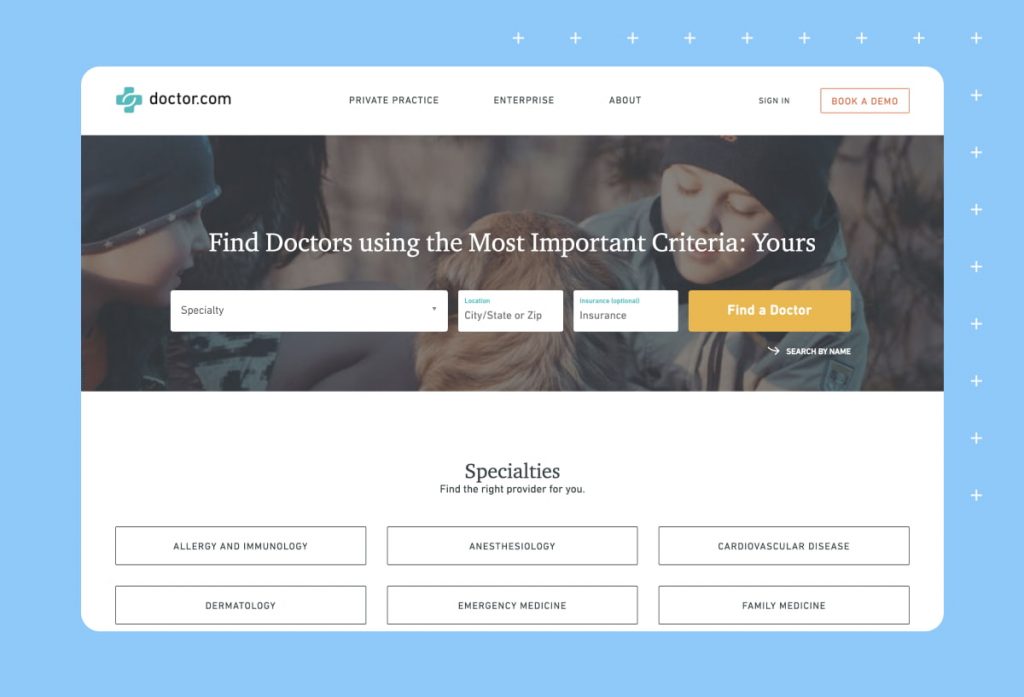
Doctor.com is one of the leading review sites in the health industry, with more than 30 million monthly users. Doctor profiles are highly detailed, with information about their certification, training, accepted insurance, hours, specialties, payment plans, and more. You can sign up for free to start collecting more reviews and attracting more patients to your practice.
2. RateMDs
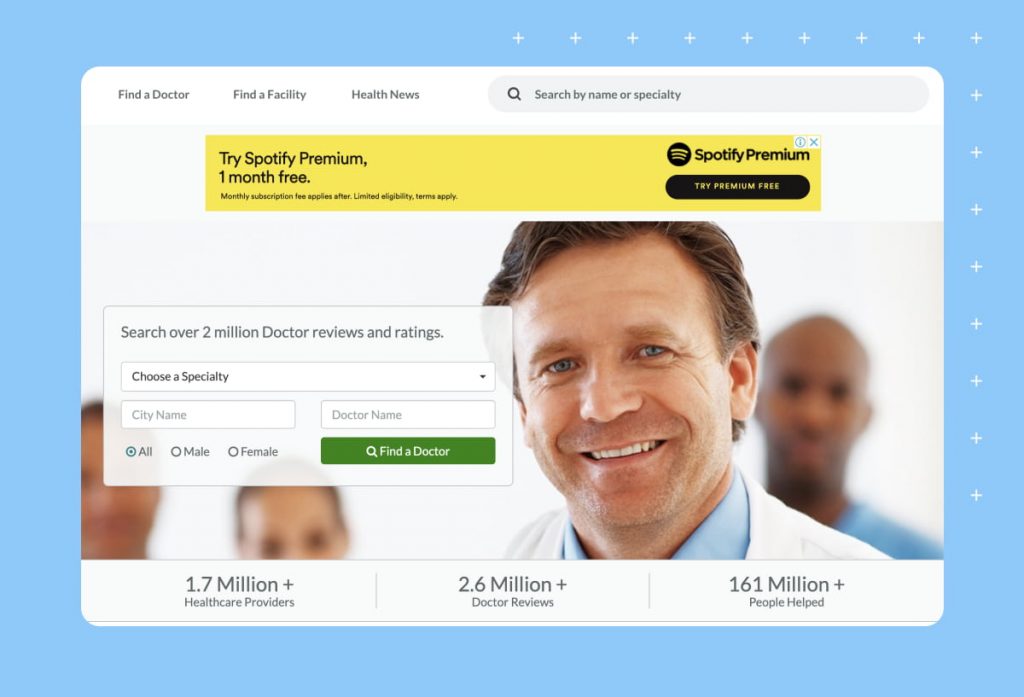
So far, RateMDs has accumulated over 1 million doctor reviews and more than 2 million doctor ratings. It provides patients with details about medical practices and individual doctors with information about punctuality, friendliness, cleanliness, and helpfulness. Physicians are scored on a 5-point scale, and written reviews are welcomed too. As a physician, you can create your profile for free. Once your profile is created, you can list all your information to help your patients find you quickly and easily.
3. Wellness.com

Wellness.com is a doctor review website that also provides a wealth of health-related resources like blogs, podcasts, and even daily horoscopes. Their physician directory provides patients with ratings, written reviews, and information like accepted insurance and certifications. To get listed on Wellness.com, you have to enroll in their Wellness Provider Program, with three levels of exposure, Verified, Enhanced, and Featured. While the Verified listing will create a free profile on the site, the Enhanced and Featured profiles provide you with more marketing efforts like SEO boosts and removing ads from your profile showcase.
4. CareDash
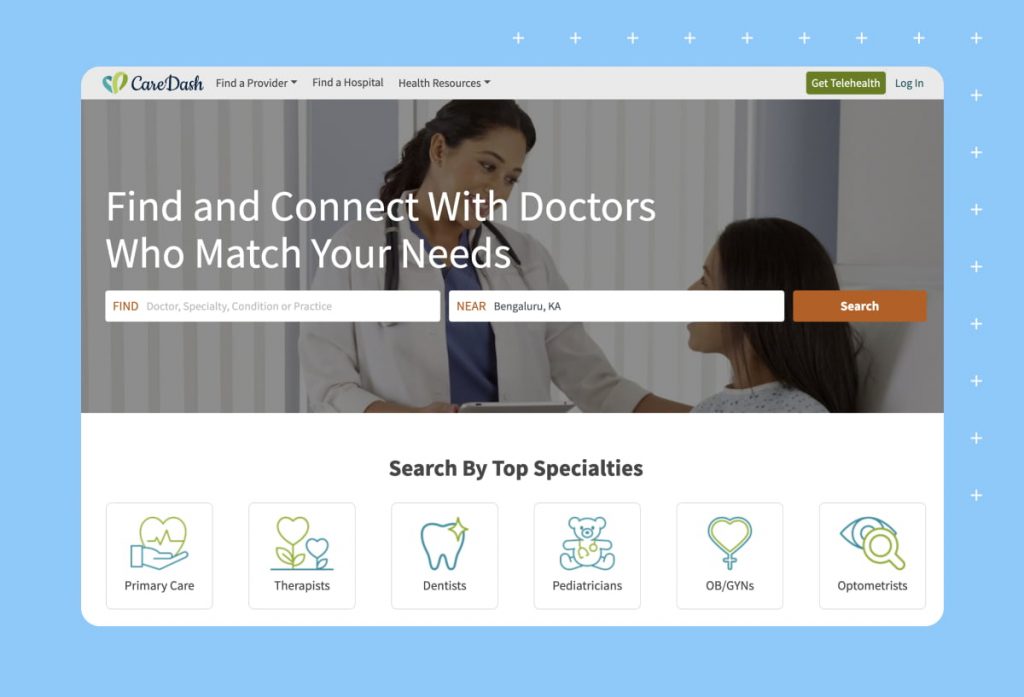
CareDash is a doctor rating site that prides itself on its transparency. With over 2 million monthly patients, CareDash is one of the most prevalent physician review sites, with over 3 million healthcare provider profiles. Patients can also directly interact with providers via a website or app. Creating a profile is free and lets you show your patients who you are with images, videos, credentials, and other important information.
5. RealPatientRatings
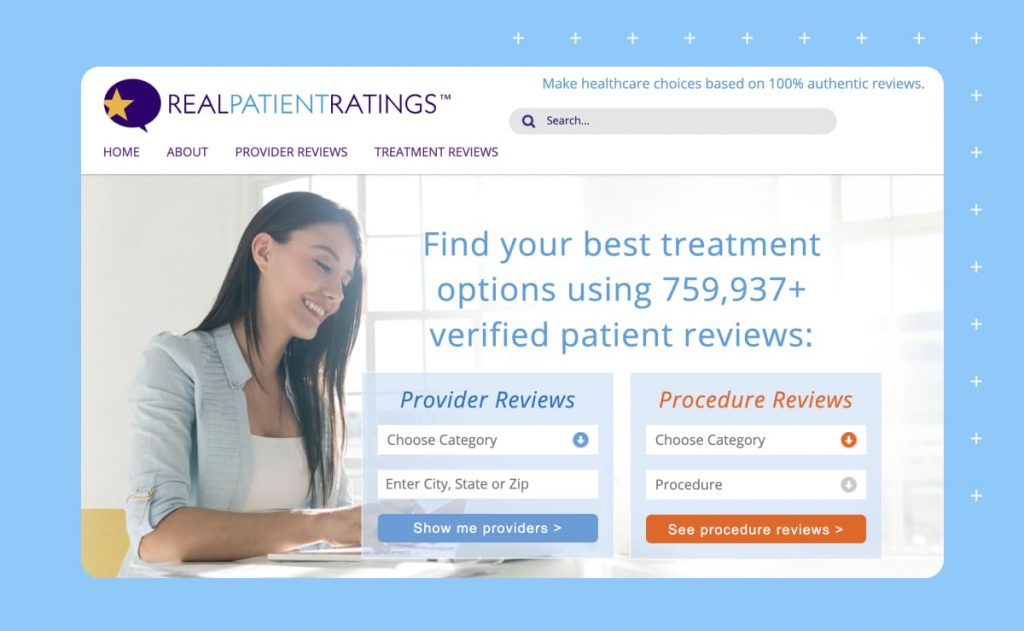
RealPatientRatings is a doctor review site that covers a wide range of healthcare services. The site has an extensive collection of patient reviews for plastic surgery procedures. The site has more than 750,000 reviews and creates detailed scoring systems for physicians, including wait time, care and concern, facility and amenities, and provider’s bedside manner. To get listed on RealPatientRatings, you need to sign up with Vizium360 to get started.
Birdeye – the ultimate doctor reputation management software your business needs
When it comes to doctor reputation management, clinics and healthcare groups need more than just a tool — they need a complete platform. Birdeye is purpose-built for multi-location medical practices, combining GenAI technology, centralized dashboards, and automation to simplify every aspect of online reputation management.
From collecting online reviews and managing listings to responding to patient feedback and analyzing performance, Birdeye helps you take control of your online reputation at scale, without overwhelming your team.
“Birdeye brings the cacophony of 150+ location directory listings and reputation management down to a harmonious blend through a single, intuitive platform. Coupled with concierge-like customer service, Birdeye’s solution has given me the perspective and agility I need to effectively manage our expansive footprint easily.”
Ken Norquist, Axia Women’s Health
But the real proof lies in the results. Here’s how two leading medical groups transformed their reputation with Birdeye:
Quick Care Med: 8x review volume, 94% response rate, zero missed feedback
Quick Care Med, a multi-location urgent care group, struggled to collect patient reviews consistently while managing review responses across dozens of platforms. With Birdeye Reviews AI and Surveys AI, they automated review requests, enabled real-time monitoring, and maintained a 94% response rate. In less than a year, they 8x’d their review volume and ensured every patient concern was addressed.
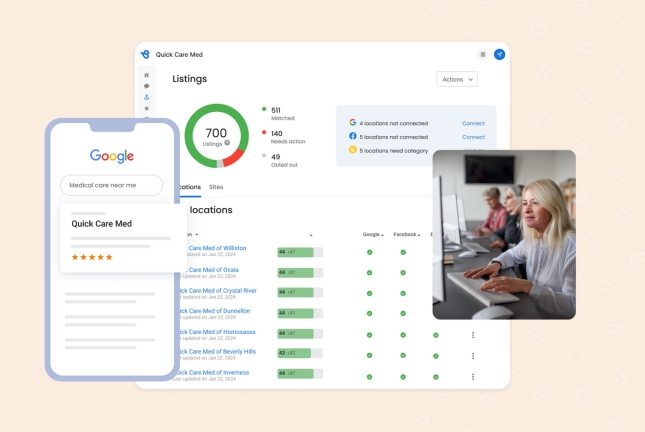
“Our teams can now respond instantly to patient reviews, and we no longer miss feedback. It’s a game-changer.” — Operations Lead, Quick Care Med
Cenegenics: Improved review generation and online visibility across clinics
Cenegenics, a personalized medicine practice, wanted to increase its online visibility and collect valuable feedback without adding complexity for physicians. By adopting Birdeye, they built automated feedback loops using review collection and survey workflows, increased positive reviews, and improved local search results.
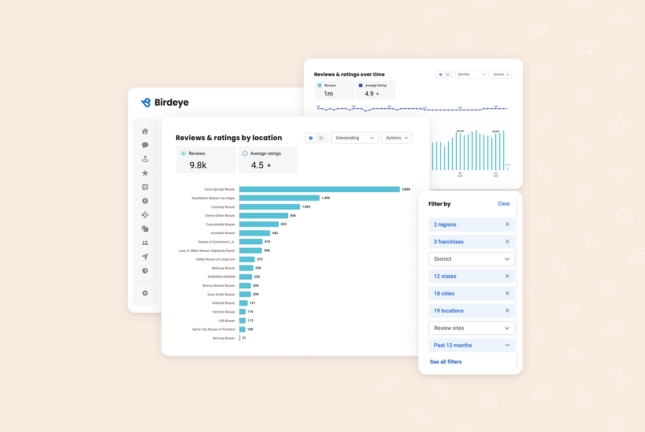
“The Birdeye platform has made our reputation strategy scalable — we now have a reliable engine to power practice growth and trust.” — Marketing Director, Cenegenics
Bottom line: Doctor reputation management is the key to patient acquisition and retention
From optimizing listings and responding to online reviews to using GenAI for scalable review management and feedback analysis, the right reputation management strategy can transform your brand perception. For multi-location practices, it’s the foundation of visibility, trust, and operational excellence. With Birdeye, you gain the tools to amplify positive reviews, resolve concerns, and build a reputation that drives both patient loyalty and long-term practice growth.
Frequently asked questions about doctor reputation management
Patients look for expertise, amenities, attention to detail, friendliness, and punctuality in a doctor. Positive reviews in these categories are all signs of a good doctor.
Yes, online reviews can determine whether new patients will choose one doctor over another and provide valuable feedback, so most doctors take online reviews very seriously.
Reach more patients with Birdeye
Managing your physician’s online reputation across multiple locations doesn’t have to be complicated. With Birdeye’s GenAI-powered platform, your team can streamline every aspect of reputation management for doctors — from review generation to competitor benchmarking, all in one place.
Here’s how Birdeye helps healthcare groups take control and scale smarter:
- Reviews AI – Automates review requests, enables AI-generated response templates, and monitors all your online reviews in one dashboard.
- Listings AI – Syncs business information across 150+ sites, improving accuracy, consistency, and local search results performance.
- Surveys AI – Sends automated surveys to capture patient feedback and generates GenAI-powered summaries to uncover key trends.
- Messaging AI – Centralizes patient communication via SMS, email, and chat, with AI-powered replies to increase speed and personalization.
- Competitors AI – Tracks how your physicians and locations rank against local competitors across review platforms and social media.
- Insights AI – Delivers actionable recommendations based on trends in patient reviews, survey data, and listing performance.
Birdeye gives your team the visibility, automation, and insights needed to build a strong online reputation, respond at scale, and grow confidently in today’s patient-driven landscape.
Watch a free demo to learn more.

Originally published









